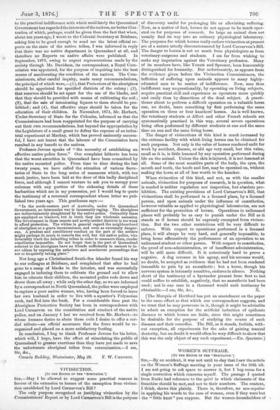VIVISECTION.
LTO THE EDITOR OF THR SPECTATOR:1
SIE,—May I be allowed to suggest some practical reasons in favour of the extension to horses of the exemption from vivisec- tion established by Lord Carnarvon's Bill ?
The only purpose recognised as justifying vivisection by the • Commissioners' Report or by Lord Carnarvon's Bill is the purpose
of discovery useful for prolonging life or alleviating suffering. Now, as a matter of fact, horses do not appear to be much oper- ated on for purposes of research. So large an animal does not usually find its way into an ordinary physiological laboratory. The purposes for which horses really endure vivisection at present are of a nature utterly discountenanced by Lord Carnarvon's Bill. The danger to horses is not so much from physiologists as from veterinary-surgeons and students. I am far from wishing to make any imputation against the Veterinary profession. Many of its members have, like Youatt and Spooner, been honourably distinguished for humanity. But unfortunately, as appears from the evidence given before the Vivisection Commissioners, the infliction of suffering upon animals appears to many highly- educated men to be matter of indifference. Now, men thus indifferent may unquestionably, by operating on living subjects, acquire practical skill and experience as operators more quickly and easily than by dissections of the dead subject. A practi- tioner about to perform a difficult operation on a valuable horse can, no doubt, learn something by first performing the same operation on three or four knackers' horses. As is well known, the veterinary students at Alfort and other French schools are systematically practised in this way, several severe operations being often performed by different students at one and the same time on one and the same living horse.
The danger of vivisections of this kind is much increased by the extreme facility with which living horses can be obtained for such purposes. Not only is the value of horses rendered unfit for work by accident, disease, or old age very small, but this value, small as it is, is little lessened by any operation performed during life on the animal. Unless the skin is injured, it is not lessened at all. Some of the most sensitive parts of the body, the eyes, the mouth and teeth, the hoofs and feet, may be operated on, without making the horse at all of less worth to the knacker. ,
When vivisection of this kind, and not, as with the smaller animals, vivisection for purposes of research, is in question, what is needed is neither regulation nor inspection, but absolute pro- hibition. The existing provisions of Lord Carnarvon's Bill, that vivisections shall be performed in a licensed place, by a licensed person, and upon animals under the influence of anesthetics, however valuable as applied to physiological laboratories, are not sufficient for the protection of horses. Operations in unlicensed places will probably be as easy to punish under the Bill as it stands as if horses should be expressly exempted from vivisec- tion. But the two other restrictions will be very difficult to enforce. With respect to operations performed in a licensed place, it will always be very hard, and generally impossible, to bring home affirmatively the performance of an operation to an unlicensed student or other person. With respect to anesthetics, the proof of non-administration, or of insufficent administration, will be still more difficult. It is notoriously hard to prove a negative. A dog screams in his agony, and his screams would, no doubt, be accepted as evidence that he had not been rendered insensible to pain by an anesthetic; but a horse, though his
nervous system is intensely sensitive, endures in silence. Nothing short of the testimony of a bystander present from first to last
could suffice to establish, negatively, that no anesthetic had been used ; not in one case in a thousand would such testimony be [The Marquis of Hertford has put an amendment on the paper to the same effect as that which our correspondent suggests, and we trust that he may persevere in it, though it might be advisable to admit an exception for the artificial induction of epidemic diseases to which horses are liable, since this might sometimes be desirable for the purpose' of studying the course of such diseases and their remedies. The Bill, as it stands, forbids, with- out exception, all experiments for the sake of gaining manual dexterity, but no doubt it would often be 'very difficult to show that this was the only object of any such experiment.—En. Spectator.]






























 Previous page
Previous page